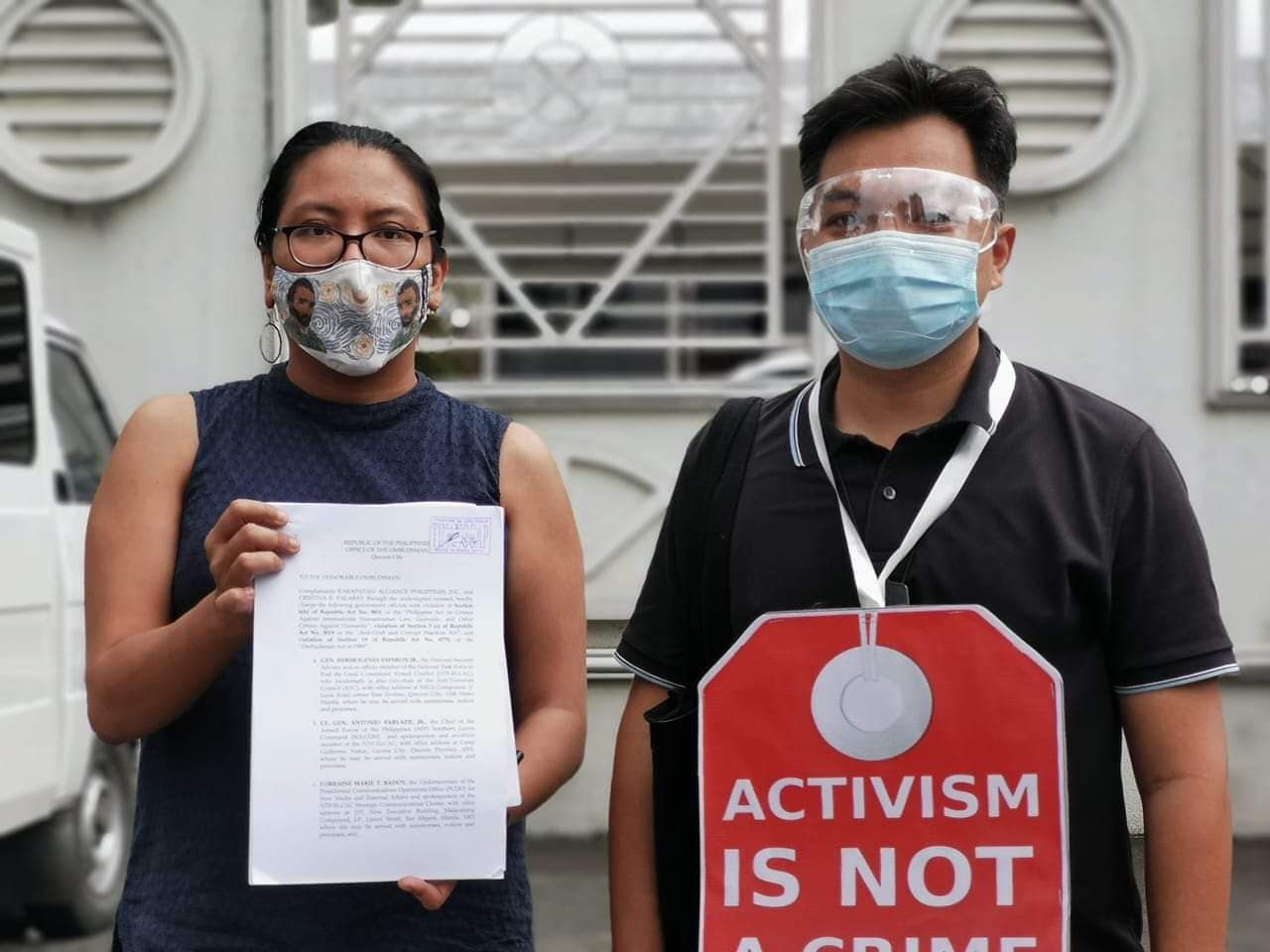SUMMARY
This is AI generated summarization, which may have errors. For context, always refer to the full article.

As the Duterte government intensifies its crackdown on activists, human rights group Karapatan has taken a shot at making red-tagging a crime, filing before the Office of the Ombudsman the first suit of its kind using the 2009 International Humanitarian Law (IHL).
Karapatan secretary general Cristina Palabay filed on Friday, December 4, criminal and administrative suits against National Security Adviser Hermogenes Esperon Jr, military general Antonio Parlade Jr, and government officials Lorraine Badoy and Mocha Uson, accusing them of committing a crime against humanity by persecution.
Esperon is vice chairman of the National Task Force to End Local Communist Armed Conflict, Parlade and Badoy are both NTF-ELCAC spokespersons, while Uson is Overseas Workers Welfare Administration (OWWA) Deputy Administrator.
Red-tagging is the act of linking legitimate progressive groups to the communist movement and its armed wing, the New Peoples’ Army (NPA). Palabay said she and Karapatan have been “persistently tagged as terrorist members or supporters of the CPP-NPA by the Respondents.”
Section 6(h) of the IHL or RA 9851 punishes persecution “against any identifiable group or collectivity on political, racial, national, ethnic, cultural, religious, gender, sexual orientation or other grounds that are universally recognized as impermissible under international law.”
Persecution is among the crimes listed under Section 6 of IHL as a crime against humanity, punishable by imprisonment of up to 20 years.
It is legal framing that has not been so used before, as Palabay said in her complaint. “Our counsels told us that Philippine jurisprudence has yet to deal with a case concerning the crime against humanity of persecution,” she said.
Palabay said that under Section 15, Philippine courts are told to take guidance from international laws in interpreting the IHL.
Palabay said the Rome Statute’s definition of persecution can be likened to red-tagging, or “acts of harassment or persecution of a person because of known or suspected communist sympathies.”
Is red-tagging a crime?
At the Senate, hearings have been held to discuss the legalities of criminalizing red-tagging, including its impact on the freedom of speech of those who red-tag.
In the past, red-tagged activists have resorted to applying for extraordinary writs like Amparo to get court protection from the military, for example.
But most of these efforts have lost, especially after 2015 when the Supreme Court decided the case Zarate vs Aquino, where the High Court said activists’ inclusion in intelligence lists “has no direct relation to the circumstances (they) experienced.”
In her suit, Palabay said that red-tagging can also be punished under Section 4(c)(1) of the IHL, which prohibits “intentionally directing attacks against the civilian population as such or against individual civilians not taking direct part in hostilities.”
“Our counsels explained to us that ‘red-tagging’ or such other similar acts or expressions, can be considered a violation of the principle of distinction,” said Palabay.
“Through red-tagging, civilians are deemed to be affiliated with or even members of the CPP or NPA. Consequently, red-tagged civilians become targets of different forms of attacks and even armed violence by State forces,” added Palabay.
Apart from the IHL, Palabay sued Esperon, Parlade, Badoy and Uson for graft saying that their red-tagging amounted to a violation of Section 3(e) which punishes any person who causes undue injury to “any party including the government.”
Lastly, Palabay said red-tagging is gross misconduct. Gross misconduct is an administrative offense that, if found guilty under, can be a cause for firing or ruspension.
Bayan Muna Representative Carlos Zarate has earlier tried this administrative suit route against Parlade in a case still unresolved by the Office of the Ombudsman. – Rappler.com
Add a comment
How does this make you feel?





There are no comments yet. Add your comment to start the conversation.